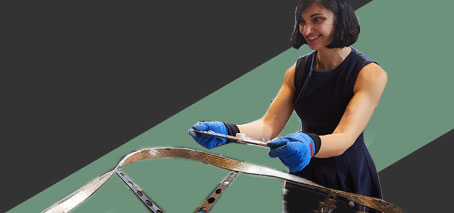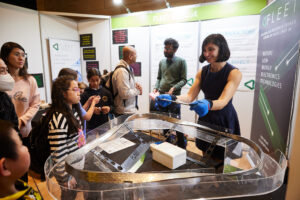
“I enjoyed interacting with the public and discussing my work. It is gratifying to learn that the public is interested in FLEET and my own research” FLEET outreach volunteer Tiziana Musso (UNSW), Image: David Swift Photography, (C) Australian Museum
The public’s awe of FLEET’s levitating superconductor and engaging dialogue with FLEET at the 2023 Sydney Science Trail enabled a shift in public understanding about how society uses digital technology and a call for a socially responsible digital future.
FLEET was one of more than 20 science organisations engaging audiences with interactive exhibits at the Sydney Science Trail Expo, developed as part of this year’s Science Week in August.
FLEET’s volunteers engaged with about 1300 members of the public and 560 students/teachers from 35 schools and home-school networks and families.
“Visitor experience of the FLEET exhibit was overwhelmingly positive and visitors learned a bit about physics – even quantum physics – and how it is applied to solve real-world problems. They gained an awareness and appreciation for the purpose and value of FLEET’s research, and thought critically about FLEET’s research and research problem,” says Jason Major, FLEET’s outreach coordinator.
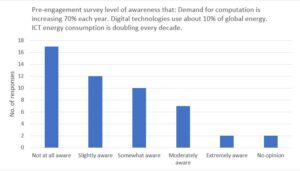
Before people engaged with FLEET at the Sydney Science Trail show most people had little or no awareness about the high level of energy consumed by digital technology
“It was highly informative and interesting, and kept me hooked the whole time.” (visitor)
“The presentation was excellent and the talk was fantastic. They really connected with my students found where they were at and continued on to their learning.” (visitor)
“This year, we wanted to more actively engage the public and students with FLEET’s research problem: the increasing and potentially unsustainable energy consumption of digital technologies,” says Jason.
“We found that before their engagement with FLEET, most people had minimal or no awareness of the problem regarding the unsustainable energy consumption of digital technology. Their experience with the FLEET exhibit had a strong impact on their awareness and, indeed understanding, of society’s use of digital technology, and what the potential implications are of this use.”
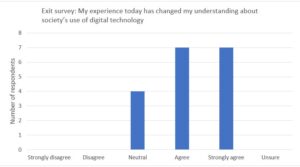
Following their experience with the FLEET exhibit, most people had a new perspective about society’s use of digital technology
Such responses were music to the ears of the FLEET volunteer crew. “I always like it when somebody asks me what’s the application of your research, or where will we use it,” says FLEET outreach volunteer Abhay Gupta (UNSW). “Working in a field like 2D materials that has potential research translation impacts makes me feel proud of my research. And to hear people’s positive responses adds to my motivation.”
Mapping people thoughts about digital technologies
Visitors used this new awareness and understanding to think critically about the value of FLEET’s research, and the key research challenge of lowering ICT energy consumption.
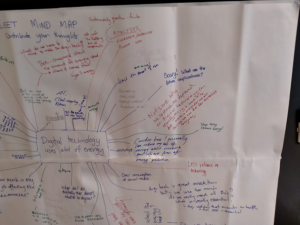
Visitors used their new awareness and understanding to think critically about the value of FLEET’s research and research problem, with ideas collected using a Mind Map technique
“People put emphasis on two different approaches to solving FLEET’s research challenge,” says Jason, who used a Mind Map for people to contribute their thoughts about the energy consumption of digital technology.
“The first approach centred on a belief that technology will be the key driver in a solution to the problem, and the second group were cultural, or socially focused, solutions.”
‘Tech-fix’ approaches included the development and implementation of low-energy electronics, but also included greater use of renewable energy sources.
Visitors that considered a ‘cultural’ approach called for a shift in how we value digital technology. Following their engagement with FLEET, people began to question their own and society’s reliance on digital technology. Visitors questioned what digital technologies have a socially responsible function and what were potentially frivolous desires.
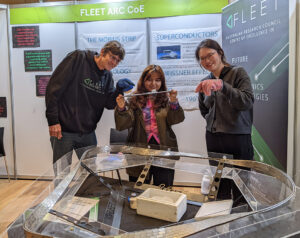
FLEET’s levitating superconductor provides a useful gateway to engaging dialogue at the 2023 Sydney Science Trail
The emphasis for this approach was to consider what digital technologies we could do without to reduce consumption of energy and ensure a shift toward more socially responsible digital future.
“Technology isn’t necessary for survival.” (Mind Map contribution)
“What do I do digitally that doesn’t need to be digital?” (Mind Map contribution)
There was also a strong concern about the source and use of the materials that enabled low-energy electronics. Any innovation in this space will need social licence, as, regardless of the approach, all visitors sought a sustainable and socially responsible digital future.
“What do we have to mine to make the digital technologies?” (Mind Map contribution)
“- not just the battery, but all components” (Mind Map contribution)
“How much is my job affecting the environment?” (Mind Map contribution)
Coordinated by the Australian Museum as part of its Sydney Science Trail event, The Sydney Science Trail Expo is a key part of how the Museum intends to inspire curiosity and interest in STEM and showcase the science community’s innovations and achievements.
FLEET participated in the event for four days, from Wednesday 16 August to Saturday 19 August. The Wednesday to Friday was open for primary and secondary school with one afternoon open to the public. On Saturday the expo was open to the public all day.
FLEET and UNSW volunteers at Sydney Science Trail this year were Kath Tajer, Gordon Luo, Abhay Gupta, Matt Rendell, Tiziana Musso, Feixiang Xiang, Michael Lord, Krittika Kumar, Daisy Wang, Xuequing Fang, Moein Seyfouri, Mahak Chhabra, Rovindra Kokate, Sankhadip Saha and Mani Mani.

